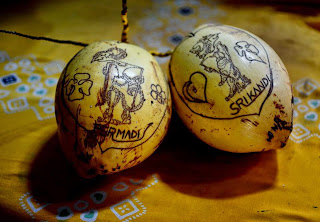In addition to sweet, this fruit has a high economic value, there is a red flesh there is also white. The fruit is a fruit pitaya, is the fruit of several types of cacti of the genus Hylocereus and Selenicereus. The fruit is native to Mexico, Central America and South America, but is now also cultivated in Asian countries such as Taiwan, Vietnam, the Philippines, Indonesia and Malaysia. The fruit can also be found in Okinawa, Israel, northern Australia and southern China. Hylocereus only bloom at night.
In 1870 the French were brought from Guyana to Vietnam as an ornamental plant. By the Vietnamese and Chinese men is considered a blessing. Therefore, the fruit is always placed between two small green dragon statues on the altar table. The red color of the fruit looks striking color green dragons. This is the fruit of a habit among the Vietnamese people are greatly affected Chinese culture known as thang loy (dragon fruit). The term Thang loy then translated in Europe and other countries who speak English as dragon fruit.
Dragon Fruit plant Varieties
For now have 4 dragon fruit varieties cultivated are:• Hylocereus undatus, a red fruit with white flesh.
• Hpolyrhizus, the pink fruit with red flesh.
• Selenicereus megalanthus fruit with yellow skin and white flesh.
• Hylocereus costaricensis, dragon fruit with a very red color of the fruit.
The benefits of dragon fruit
Besides the sweet refreshing, dragon fruit is rich in benefits. Many people believe this fruit can lower cholesterol and balance blood sugar. No studies on the benefits of this fruit, but because it came from the type of dragon fruit cactus fruit believed to contain vitamin C, beta carotene, calcium, and carbohydrates. Dragon fruit contains high fiber which binds carcinogens cause cancer and accelerate the process of digestion.Dragon fruit cultivation in Indonesia
In general, dragon fruit cultivated by cuttings or seed seeding. Plants will thrive if planted porous media (not muddy), nutrient-rich, sandy, enough sunshine and temperatures between 38-40 ° C. If treatment is good enough, the plants will begin to bear fruit at the age of 11-17 months. Malang City is 400-700 above sea level, is very suitable for the cultivation of red dragon fruit. Despite having a fairly cool air, but it gets enough sunlight is a requirement of red dragon fruit growth.Pitaya fruit or dragon fruit plant can be grown with soil conditions and elevation of any location, but it's quite the voracious plant nutrients, so if the soil contains a good fertilizer, the growth will be good. Within 1 year, dragon fruit tree can reach a height of 3 feet. According to some sources, dragon fruit has not been widely cultivated in Indonesia. In the meantime, the area Mojokerto, Jember, Malang, Pasuruan, Banyuwangi, Ponorogo, and Batam is an area that has been cultivating this plant.
Ref : Wikipedia, http://agriculturproduct.blogspot.com



